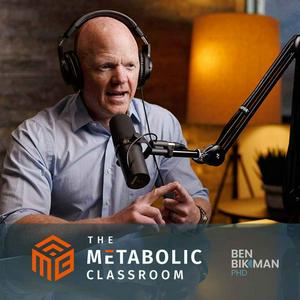Menopause, Ketones, and Metabolism: A Strategy Explained
📢 Dr. Bikman’s Community & Coaching Site, Insulin IQ: https://insuliniq.comand/or📢 Become an Insider, Ben’s website: https://www.benbikman.comThis Metabolic Classroom lecture with Dr. Bikman explores how the loss of estradiol during menopause affects five key metabolic systems: the brain, muscles, mitochondria, fat tissue, and inflammation.Each of these systems relies on estradiol for optimal function, and its decline contributes to increased risk for cognitive impairment, muscle loss, reduced mitochondrial function, increased visceral fat, and systemic inflammation.Ketones—particularly beta-hydroxybutyrate (BHB)—can provide a partial compensatory effect in each system. In the brain, BHB supports glucose metabolism, reduces neuroinflammation, and enhances neuroplasticity. In muscles, ketones reduce protein degradation and improve mitochondrial function. At the mitochondrial level, BHB promotes mitochondrial biogenesis and helps reduce oxidative stress through NRF2 activation.The lecture also outlines how ketones affect fat tissue by promoting mitochondrial uncoupling and upregulating thermogenic genes like UCP1. Additionally, BHB helps reduce inflammation by inhibiting the NLRP3 inflammasome. A final section reviews exogenous ketone strategies—salts, esters, acids, and MCTs—as potential tools to support women through menopause-related metabolic changes.Show Notes/References:For complete show notes and references, we invite you to become an Insider subscriber. You’ll enjoy real-time, livestream Metabolic Classroom access which includes live Q&A with Ben after the lecture, ad-free podcast episodes, show notes and references, online Office Hours access, Ben’s Research Review Podcast, and a searchable archive that includes all Metabolic Classroom episodes and Research Reviews. Learn more: https://www.benbikman.com Hosted on Acast. See acast.com/privacy for more information.
